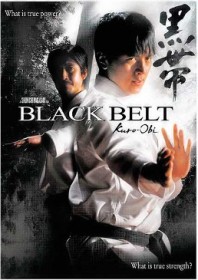
Set soon after the Japanese invasion of Manchuria, what hints at a political, revisionist war film soon starts to resemble a symbolic study into karate’s ethics and practitioners. As much as this is a martial arts film, it is also a film about martial arts, which makes it fulfilling for quite different reasons. Director Nagasaki adds extra authenticity by casting real karate experts in the lead roles.
The film starts with an opportunistic siege on a dojo by wayward Japanese military police. The police are thwarted on their first attempt by the clinical karate skills of the school’s three prized fighters, but the school succumbs on a second attempt following the death of their sensei.
Following the familiar tradition of yin versus yang, one karate fighter contradicts the advice of his late master and the other follows a purer, peaceful path. This is represented physically via their chosen technique: one is primed to attack; the other trained only to defend. Taikan (played by “Japanese Karate Association instructor” Tatsuya Naka) becomes the sake-guzzling womanising poodle to a power crazed militia utilising his unparalleled martial arts skills to kill off rival fighters, while Giryu (played by Akihito Yagi from the “International Meibukan of Goju Ryu”) is harboured by a peasant family and forced into confrontation – albeit against his will – when the family’s young daughter is kidnapped.
The film’s most poignant subplot involves Taikan’s belief that he is the rightful heir to his former school’s hallowed black belt, which takes on a crucial symbolic significance. Ultimately, the mere possession of the belt is incidental – it is tellingly kept in a box and never worn – and Taikan’s insatiable quest for its possession is balanced by the solemn indifference from his opposing half. Giryu’s final sacrifice at the movie’s end is befitting to both their polarised beliefs and in the true redemptive spirit upon which the ideals of karate are based.
Followers will enjoy Fuyuhiko Nishi’s fresh, free-flowing choreography captured elegantly by Nagasaki’s wide lens. It is so refreshing to see a fight film free from wires and computer generated effects, and the film’s approach to capturing both the merits and the corruption of karate in all its idiosyncratic forms is an endeavour worth applauding. A slight reliance on cliché (Star Wars-esque visions of a dead sensei; villainy which borders on caricature; a slightly twee red balloon metaphor) seems nit-picky for what is ostensibly a competent, erudite and moralistic tale.
AKA: Kuro-obi
- Country: Japan
- Action Director: Fuyuhiko Nishi
- Directed by: Shunichi Nagasaki
- Starring: Akihito Yagi, Shinya Ohwada, Takayasu Komiya, Tatsuya Naka, Yuji Suzuki
- Produced by: Katsuhiro Ogawa, Nobuhiko Sakoh
- Written by: George Iida
- Studio: Crossmedia, Kuro-Obi Partners, The Klockworx












